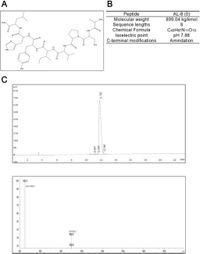The treatment of autoimmune diseases has taken a significant leap forward with the development of AL-8(0), a novel peptide designed to inhibit the IL17A-IL17RA signaling pathway, a key mediator in pro-inflammatory responses. Developed by a team of researchers led by Xinmin Wang and detailed in their recent publication in Scientific Reports, the peptide shows potential as a practical alternative to monoclonal antibodies currently used in therapies for conditions like psoriasis and rheumatoid arthritis.
Interleukin-17 (IL17) is a cytokine pivotal for immune responses, and dysfunctional signaling through the IL17A-IL17RA pathway is implicated in various autoimmune diseases. While existing therapies targeting IL17 have proven effective, they often come with challenges such as high costs and a lack of oral bioavailability. The research team sought to address these issues with AL-8(0), which presents a lower-cost, easier-to-produce solution that could potentially be taken orally.
In laboratory tests, AL-8(0) demonstrated a strong binding affinity to the IL17 receptor, IL17RA, with analyses revealing binding affinities of 89 nM by microscale thermophoresis and 83 nM by surface plasmon resonance. Importantly, the efficacy of AL-8(0) was confirmed through a series of biophysical and functional assays, which illustrated its ability to inhibit the production of pro-inflammatory cytokines such as TNFα and IL1β in IL17RA-expressing cells.
"This is a groundbreaking step in the quest for more effective treatments for autoimmune diseases with fewer side effects than current monoclonal antibody therapies," wrote the authors of the article. By blocking the IL17A-IL17RA interaction, AL-8(0 not only curbs inflammation but also demonstrates a strong safety profile, with no observed cytotoxicity across various tested concentrations.
To validate their findings, researchers created IL17RA-deficient cell lines to demonstrate the specificity of AL-8(0)'s action. The peptide displayed no anti-inflammatory effects in these cells, confirming that its mechanism of action is strictly dependent on the presence of IL17RA.
The potential therapeutic implications of AL-8(0) extend beyond its efficacy against inflammation; it may also represent a more scalable and economically viable option for widespread treatment of autoimmune disorders. By addressing the limitations associated with current antibody therapies, researchers believe that AL-8(0) could significantly improve treatment adherence among patients who prefer oral medications.
Long-term administration of proteins and antibodies often leads to complications related to immunogenicity, which can limit their effectiveness over time. The authors are optimistic that peptides like AL-8(0, which are less likely to provoke immune responses, may serve as effective alternatives in the long run.
However, detailed in vivo studies are still needed to fully assess the peptide's safety and effectiveness in real-world biological systems. Future research will also explore structural modifications to enhance the peptide's stability and bioavailability, further characterizing AL-8(0) as a promising candidate drug for treating chronic inflammatory conditions.
The emergence of AL-8(0) could change the landscape of therapeutic approaches for autoimmune diseases, representing a significant stride towards tailored, accessible, and effective treatments for patients hindered by current limitations in available medications.




